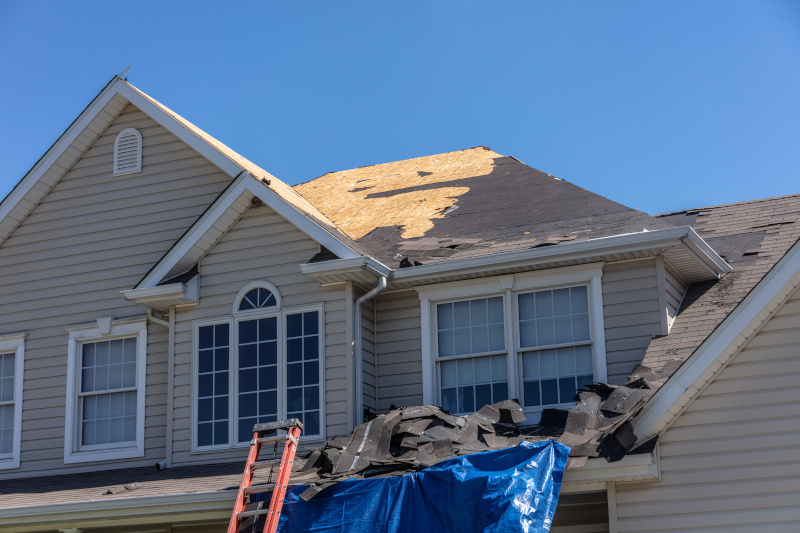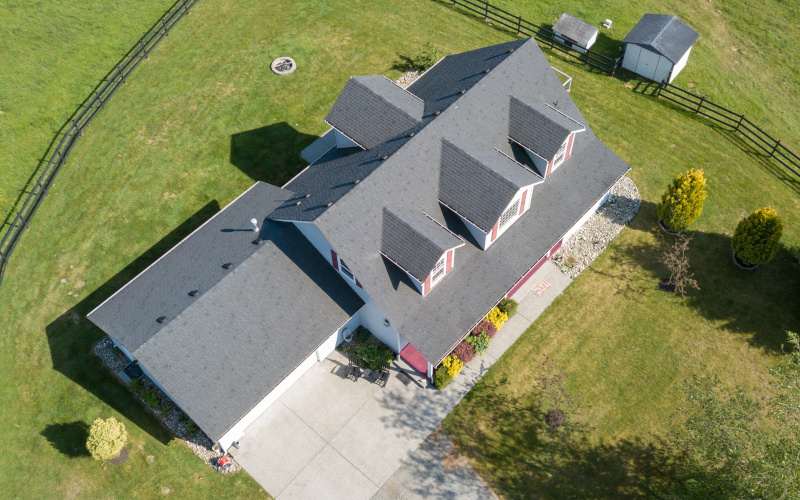How Long Does a Roof Last?
Buying a home is often the biggest investment that modern adults will make – and it comes with many additional expenses. Some expenses are unexpected, while others can be planned for. One of the most expensive (and most feared) costs of homeownership is roof replacement. Because of this, many homeowners are left wondering how long their roof will last.
Discount Roof is here to answer this question and provide guidance so that you can anticipate your roof replacement. Read on to better understand how long you can expect your roof to last and what you can do to extend its functional life.

What Factors Influence Your Roof’s Lifespan?
While it’s unlikely that you can anticipate the exact day that your roof will need to be replaced, there are many factors that do influence how long your roof will remain operational. From the weather in your area to the style of your roof, there’s a lot to consider. Let’s explore some of the variables that will affect how soon you will need a roof replacement.
- Climate
For most roofing materials, the weather plays a significant role in your roof’s lifespan. In areas with frigid winters, ice and snow can cause damage to your roof’s structure. As the roof becomes wet and freezes, the expansion can pull roofing materials away from the underlayment.In addition, ice dams can form toward the bottom of the roof as water melts, travels down the roof, and refreezes. This is more common in homes with inadequate attic insulation, but it can happen to any structure at times. Ice damming can be destructive, as it can cause water damage and rip your roofing materials and gutters away from your home.
In contrast, areas with high levels of sun exposure and hot temperatures can also influence the lifespan of a roof. For shingled roofs, the heat of the sun can cause the shingles to warp and corrode. In addition, the coating on metal roofs can be weakened by heavy sun exposure. Overall, the direct rays of the sun and extreme temperatures can cause damage to roofing materials and shorten the lifespan of a roof.
- Attic Insulation & Ventilation
Having proper attic insulation is beneficial because it lengthens the lifespan of a roof. During summer and winter months, the temperature inside and outside of your home is often contrasting. This can cause a variety of complications.Firstly, the temperature difference can lead to ice damming in the winter. This is because the heat inside your home escapes through the attic space, heating the roof. In turn, the snow and ice can melt and travel down to cooler areas of the roof. Here, the water will refreeze and form an ice dam. This traps water on your roof because it cannot drain effectively, causing damage to your roofing materials.
Secondly, in the summer, the temperature in your home is often much cooler than the outdoor temperature. When this cool air meets the warmth of your roof, condensation can form. This will lead to mold growth and rotting, both of which can harm your roof.
Therefore, adequate attic insulation and ventilation are imperative to keep your roof healthy and functional. These work together to keep your attic and roof at a dry, steady temperature.
- Roofing Materials
Of the factors that influence the lifespan of your roof, the roofing material is the most easily controlled. Some materials will last for much longer than others. For example, metal roofs often last the longest, with a functional lifespan of 50 or more years. In contrast, shingled roofs may only last 15-20 years. While this is true, many people still opt for asphalt shingles due to the cost and ease of installation.Besides the roofing materials themselves, the color of your materials also impacts the roof’s lifespan. Darker roofing materials absorb more heat from the sun, which can cause damage more quickly. Lighter shades often don’t heat as readily, which can allow them to last for longer.
- Roof Design
In addition to the roofing materials, the design of your roof can also impact its lifespan. With a more gradual slope, water cannot drain as effectively. This may cause your roof to retain moisture, which can lead to mold, mildew, and algae growth. Unfortunately, these will damage your roofing materials and shorten the lifespan of a roof. - Regular Roof Maintenance
Another controllable factor that influences your roof’s lifespan is routine maintenance. Yearly, you should schedule a roofing inspection. This allows your roofer to discover any budding problems and recommend roof repair solutions before you are facing a more serious complication.In addition, you should have your roof inspected after severe storms, tree branches falling, or other damaging events. This allows you to quickly repair your roof before a minor problem develops into a more severe, widespread issue. Regular roof inspections can prolong the life of your roof and save you money on repair bills.
- Quality of Your Roof Installation
The last (and significant) consideration is the quality of your roof installation. While you can’t control who installed the roof on a house you have purchased, you can decide who performs the maintenance going forward. In addition, when it is time for a roof replacement, you need to find the most qualified, reliable roofer for the job.At Discount Roof, our team has been working in the industry for more than 30 years, and we are skilled and prepared to install your new roof. We understand that high-quality installation is one of the most important factors in roof longevity, so we take pride in delivering excellent work with every roof replacement and roof repair project. We will make sure your roof is there to last!
As you can see, there are many influencing factors that determine the lifespan of a roof. From the materials and style of the roof to the routine maintenance, there are several variables. To ensure you have a durable, long-lasting roof, you should always hire a dependable roofer, like the team at Discount Roof.
How Long Do Shingles Last?
Because asphalt shingles are the most common residential roofing material in the United States, many homeowners wonder how long their roofing shingles will last. This roofing material is durable and can readily withstand most climates. While shingles can be damaged in the wind or snow, they usually stand up to most weather conditions.
In general, asphalt shingles tend to protect your home for 15-20 years without significant complications. Architectural shingles may last longer, with an average lifespan of 20-30 years. That being said, many shingled roofs will need repair before this time. In especially windy climates, shingles may become displaced. Oftentimes, these repairs can be quick and simple. Most shingled roofs will not need replacing until closer to twenty years.
Regardless of the style of shingles, it’s important to always schedule regular roof maintenance. This allows for the replacement of single shingles as opposed to having to replace the whole roof once a small leak has progressed to severe damage. In addition, it allows you to catch deterioration early so that you can begin to prepare for an upcoming roof replacement.
Overall, asphalt shingles are an affordable, reliable roofing solution. After 15-20 years, however, you should be prepared for a roof replacement.
So, When Will You Need a Roof Replacement?
While it’s impossible to predict exactly when your roof will be to be replaced, most new roofs last for many, many years. With asphalt shingle roofs, a replacement is not often needed for 20+ years. Wooden roofs may last 30 years, and metal roofs may last 50 or more years. There are many roofing styles, and each has pros and cons. Regardless of your roofing materials, you should expect that your roof will last for many years when it is properly maintained.
Routine roofing inspections and roof maintenance are essential. They protect you from premature roof replacements by locating and resolving problems early. To prolong your roof’s lifespan, you should schedule annual roofing inspections and perform preventative maintenance.
Roof Longevity Overview
In review, every roof is different. A roof’s lifespan is influenced by the climate, roofing materials and color, roof style, attic insulation and ventilation, routine maintenance, and quality installation. By optimizing these factors, you can extend the lifespan of your roof.
While asphalt shingles tend to last around 20 years, metal roofs can last for 50 or more years. Other roofing materials vary as well. Regardless of the material, the most important way to lengthen the lifespan of a roof is with regular roofing inspections and maintenance.

Discount Roof is Here to Answer Your Roofing Questions!
Do you think you may need a roof replacement? Or maybe you want to schedule an inspection to check the health of your roof? No problem! Discount Roof provides thorough, honest roofing inspections in Indiana. We deliver lasting results, with the most effective roof repair and durable roof replacements in the area.
If you have questions regarding your roof longevity, give us a call! We are happy to answer your roofing questions and help you find the best solutions to your roofing problems. Contact us today!
